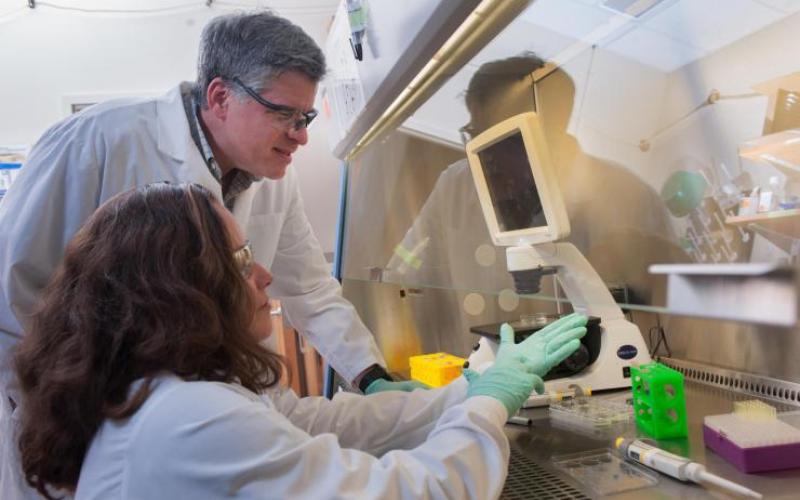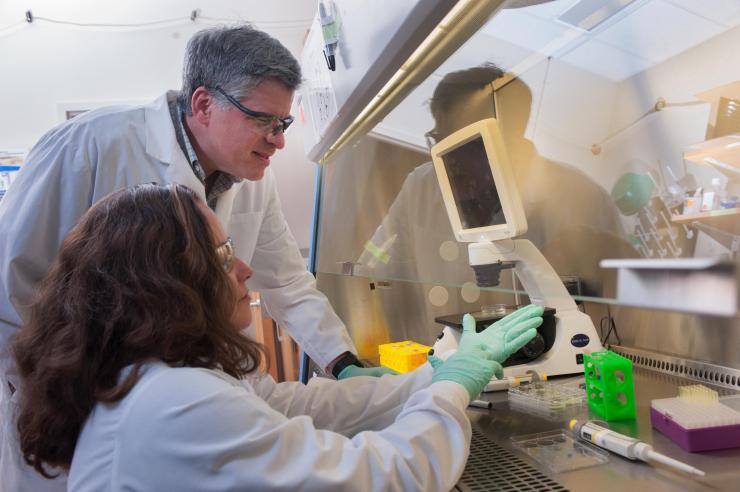Georgia Clinical & Translational Science Alliance Receives $51 Million NIH Grant
Sep 25, 2017

After a decade of research collaboration, the Atlanta Clinical & Translational Science Institute (ACTSI) will welcome a new partner and change its name, reflecting a new statewide focus. The University of Georgia will officially become the fourth academic partner, and ACTSI will now be known as the Georgia Clinical & Translational Science Alliance (Georgia CTSA).
This alliance is celebrating 10 years of research advancement by expanding across the state through a five-year, $51 million Clinical and Translational Science Award (CTSA) from the National Institutes of Health (NIH). The Emory University-led Georgia CTSA will focus on transforming the quality and value of clinical research and translating research results into better outcomes for patients.
The Georgia CTSA unites the strengths of its academic partners: Emory University, Morehouse School of Medicine, the Georgia Institute of Technology, and the University of Georgia. Emory is a national leader in health care and biomedical research as well as an outstanding leader in clinical and translational research training and education. Morehouse School of Medicine is a nationally recognized historically black institution that brings ethnic diversity to biomedical research, addresses health disparities through successful community engagement research, and serves as a pipeline for training minority researchers. Georgia Tech is a national leader in biomedical engineering, bioinformatics and the application of innovative systems engineering to health care solutions. The University of Georgia has a proven track record in outstanding basic and translational research and, as the state’s land grant institution, offers a robust statewide network that enhances community outreach, service and research.
“Continuing such an alliance and involving these leading state institutions is extremely important and in line with Georgia’s goals for the promotion of clinical and translational research, innovation and development,” said Georgia Governor Nathan Deal. “Having an active Clinical & Translational Science awardee in Georgia has brought our citizens cutting edge cures and the latest in clinical and translational research.”
Georgia CTSA is one of 64 Clinical and Translational Science Awards (CTSA) at major academic medical centers across the country, funded by the National Institutes of Health’s National Center for Advancing Translational Science, and it is the only CTSA in Georgia. The award will fund cores focused on improving quality, efficiency and collaboration of the research process; provide consultative support and new tools in informatics and biostatistics; pilot funding for new research projects, training and workforce development, while integrating special populations and focusing on participant interactions, and creating local centers tackling clinical trial inefficiencies.
The Georgia CTSA welcomes contact principal investigator (PI) at Emory, W. Robert Taylor, M.D., Ph.D., and a new multi-PI leadership structure:
W. Robert Taylor, MD, PhD
Contact Principal Investigator, Georgia CTSA
Interim Chair, Department of Medicine
Director, Division of Cardiology
Marcus Chair in Vascular Medicine
Professor of Medicine and Biomedical Engineering
Emory University School of Medicine
Elizabeth O. Ofili, MD, MPH
Principal Investigator, Morehouse School of Medicine, Georgia CTSA
Professor of Medicine, Cardiology
Senior Associate Dean of Clinical and Translational Research
Director, Clinical Research Center
Morehouse School of Medicine
Andrés J. García, PhD
Principal Investigator, Georgia Institute of Technology, Georgia CTSA
Rae S. and Frank H. Neely Endowed Chair and Regents' Professor, Woodruff School of Mechanical Engineering and Petit Institute for Bioengineering and Bioscience
Director, Interdisciplinary Bioengineering Graduate Program
Georgia Institute of Technology
Bradley G. Phillips, PharmD, BCPS, FCCP
Principal Investigator, University of Georgia, Georgia CTSA
Millikan-Reeve Professor and Head, Clinical & Administrative Pharmacy, College of Pharmacy
Director, Clinical and Translational Research Unit (CTRU), Office of Research
University of Georgia
Henry M. Blumberg, MD
Principal Investigator, KL2 and TL1, Georgia CTSA
Professor of Medicine and Epidemiology, Division of Infectious Diseases
Emory University School of Medicine
"The Georgia CTSA creates a unique opportunity for synergy among historic partners in health care, education, and cutting edge research, and has emerged as an innovative and integrated environment where clinical and translational researchers can flourish," said Taylor. "The Georgia CTSA is a catalyst and incubator for clinical and translational research across the state, with impacts throughout the Southeast and nation."
The Georgia CTSA has improved health care and research for Georgia citizens through collaboration with the Grady Health System, Children’s Healthcare of Atlanta, Atlanta VA Medical Center, Georgia Research Alliance, Georgia Bio, and multiple community medical groups throughout the state.
"Georgia CTSA continues established, strong clinical and research partnerships by leveraging the infrastructure support of the NIH-funded Research Centers at Minority Institutions (RCMI) at Morehouse School of Medicine. We will continue to implement innovative patient centered and participatory care delivery models, toward the elimination of health disparities," said Ofili.
“Georgia CTSA’s innovative support of discovery and collaborative partnerships help to rapidly translate scientific discoveries and new technology, which positively impacts patient care in Georgia. This is an exciting story for the state,” said Garcia. “The new alliance is improving health care and clinical research for the citizens of Georgia and continues to create synergies that foster and accelerate new and emerging technologies and discoveries.”
“The addition of the University of Georgia provides the Georgia CTSA a statewide footprint to connect with every county in the state to address health and wellness needs, particularly in rural and underserved populations; opportunities for continued excellence in research by strengthening existing and expanding new research collaborations; and the ability to enrich interprofessional education to include students and trainees from pharmacy and other disciplines so that they can learn how to work together as a team to discover new approaches and treatments that improve health and patient care,” said Phillips. “As a new member of the Georgia CTSA, faculty and students across our campus will have unique support and infrastructure that builds upon current capabilities and increases our trajectory in fostering clinical and translational science in the state and beyond.”
Written by Georgia Clinical & Translational Science Alliance.
For more information, please visit www.GeorgiaCTSA.org


